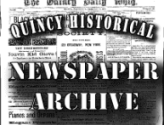Lincoln on the Web
By the year of Lincoln’s bicentennial, it has become possible for scholars to read and search most of the major primary sources associated with his life and career online. All of Lincoln’s writings are now online, including materials previously unpublished in the Collected Works of Abraham Lincoln series but that are now being posted by the Papers of Abraham Lincoln. Most of his papers stored at the Library of Congress have been digitized and transcribed. There is an online version of the Congressional Globe, and several major newspapers and periodicals from the era are now accessible free, online. There are also other types of sources available. The Illinois Historic Preservation Agency has posted his day-by-day calendar and keeps updating this invaluable reference source. The Abraham Lincoln Association has posted its scholarly journal and numerous other valuable secondary sources—all for free. The Lincoln Studies Center at Knox College has posted an expanded version of Michael Burlingame’s two volume biography, Abraham Lincoln: A Life (2008) that includes some text and extensive endnote material omitted from the printed edition. In 2009 several institutions have posted special exhibits that offer stunning visual images and other fascinating material from the Lincoln canon. The following list of about forty sites represents a selection of these digital resources divided into four categories: primary, secondary, visual, and general.
Primary
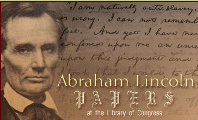
Offers digital access to the collection of Abraham Lincoln Papers at the Library of Congress (formerly known as the Robert Todd Lincoln Collection), about 20,000 items ranging from 1833 through 1916. Facsimiles are available for every document, and transcriptions for about half of the material.
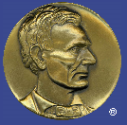
Contains Roy P. Basler’s eight-volume collection of Lincoln’s correspondence and speeches. No facsimiles are available and does not yet include supplements to the Collected Works published in 1974 and 1990, nor the latest discoveries hosted by the Papers of Abraham Lincoln.
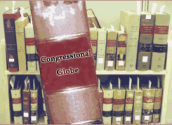
Contains a record of congressional debates between 1833 and 1873. Transcripts are not generally available for sessions before the 32nd Congress (1851).

Provides a research engine for the era from 1840 to 1880 and includes documents, images, and a variety of other resources for the study of Lincoln and his contemporaries.
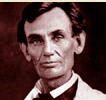
Serves as the free, online version of the well-regarded Lincoln Legal Papers database. Includes a searchable database for all of Lincoln’s known legal cases. The Web site also features reference pages, including a narrative overview, glossary, maps, illustrations, biographies, and other useful information.
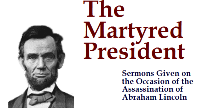
Contains fifty-seven full-text sermons from different regions and religious denominations on Abraham Lincoln’s death. TIFF files are available for every sermon.
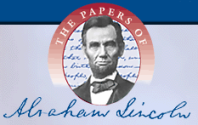
Aspires to provide the central location for all of Lincoln’s writings, correspondence, and legal papers. Currently provides access to recently discovered letters and documents not in Roy P. Basler’s Collected Works (1953) or either of the published supplements. The Lincoln Legal Papers currently appears on this site as series 1 of the project.

Contains a large and growing collection of Pennsylvania newspapers published from the 1830s to 1870s. There are a number of freely available collections of historic newspapers from different states across the country, but this Pennsylvania project is one of the most advanced.
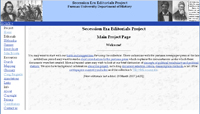
Provides transcripts from a wide range of newspapers on key topics from the 1850s: Kansas-Nebraska, Charles Sumner’s caning, Dred Scott, and John Brown’s Raid. Though the technology of this site has become a little out-dated, the free content is particularly useful for understanding Lincoln's rise to the presidency.
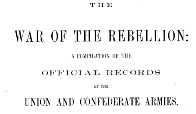
Offers full-text searchable access to the entire multivolume series of reports, correspondence, orders, maps, and other documents that constituted the standard reference source on the Civil War, known generally by scholars as the OR for Official Records.

Spearheaded by Edward Ayers and a team of digital humanists and historians at the University of Virginia, the Valley Project was one of the pioneering digital projects in the field and offers a unique archive of materials from two counties in the valley between Pennsylvania and Virginia. The Valley archive holds everything from census records to letters and diaries, from partisan newspaper accounts to land records.
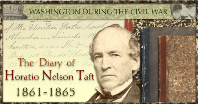
Offers access to the three-volume diary of an examiner for the U.S. Patent Office who lived in Washington, DC throughout the Civil War. Taft recorded daily entries until April 11, 1862. Taft’s youngest son played with Willie and Tad Lincoln and one of his older sons, Charles Sabin Taft, a US Army surgeon, cared for Lincoln after he was shot.
Secondary

Provides Lincoln scholar Brian Dirck’s thoughtful perspective on the evolving scholarship on Lincoln and the Civil War era.

Features Michael Burlingame’s unedited manuscript of Abraham Lincoln: A Life (2008). Chapters, which are available as individual PDF files, include footnotes that provide more extensive discussion on the secondary literature than available in the print edition.
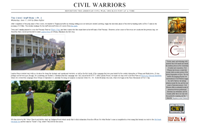
Features a leading Civil War blog written by notable military historians such as Mark Grimsley, Ethan Rafuse, and Brooks Simpson. The blog often provides sharp analysis of ongoing interpretative disputes regarding Lincoln and his relationship with various military figures.

Features a variety of primary and secondary source material on Lincoln and the era. The site features particularly useful webcasts, audio podcasts, and essays from leading Lincoln scholars such as Douglas L. Wilson and Harold Holzer.

Offers not only full-text access to Guelzo’s 2007 article on the Lincoln-Douglas campaign, but also provides a variety of primary and general resources, including detailed maps, for researchers and teachers interested in the subject.

Offers full-text access to the leading periodical devoted exclusively to Lincoln scholarship, featuring every issue from 1979 to the present.
Provides free, full-text access to most of the modern issues of the Journal of Illinois State Historical Society. Articles from Northern Illinois University cover the period 1979-2006.

Features a variety of Lincoln-related content developed over the years by C-SPAN. The site contains video and audio archives from C-SPAN programming, including tapes of Booknotes episodes on Lincoln scholarship, original documentary material, and the well-known reenactment of the Lincoln-Douglas debates.

Offers a variety of information on Lincoln’s presidency filtered through the focus of his wartime retreat, the Soldiers’ Home. The blog is particularly active and contains a number of insights on evolving interpretive issues.
Visual — historical images and artifacts
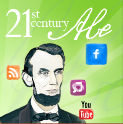
Hosts a unique collection of modern photos, images, videos, and essays that explore Lincoln’s legacy in a twenty-first-century context.

Offers photographs of rare Lincoln artifacts as part of a compact biographical narrative.
_12452061841)
Provides digital access to a selection of material from the Alfred Whital Stern Collection of Lincolniana, including drawings, maps, sheet music, broadsides, and other printed material. Features the original scrapbook that Lincoln created for his 1858 debates with Douglas and images of the contents of his pocket on the evening of his assassination.

Features a blog by artist Maira Kalman that uses visual narrative to explore the author’s fascination with Lincoln and his relevance to the modern day.
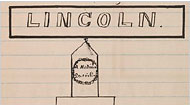
Features a diary of drawings from an anonymous New York resident detailing the city’s stunned reaction to Abraham Lincoln's assassination, including annotations by scholar Ted Widmer.

Contains over 6,000 photographs from Mathew Brady’s collection, including thirty eight images of Abraham Lincoln.
Provides numerous photos and portraits of Lincoln from different stages in his life along with supporting text. Also includes portraits and information about Lincoln’s contemporaries and lesson plans for teacher use.
Includes rare images as well as written pages on themes in Lincoln’s career, vignettes from his life, and links to other online resources.
General

The Abraham Lincoln Bicentennial Commission has created a useful site for the two-hundredth anniversary that features information on Lincoln-related events and provides helpful resources for teachers. The commission, however, has serious plans to grow their digital holdings in the years after the bicentennial, hoping to offer a true research gateway for scholars in addition to their services for the general public.
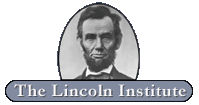
Provides links to an ambitious variety of digital projects developed by Richard Behn that include “Mr. Lincoln's White House,” “Mr. Lincoln & Friends, “Mr. Lincoln and Freedom,” “Abraham Lincoln’s Classroom,” and “Mr. Lincoln and New York.” The sites provide generous excerpts from primary sources and offer solid reference information.

Provides the latest in Lincoln news and events, a bibliography of recent Lincoln books, and a number of other helpful resources and links.

Contains still-useful general reference information on the State of Illinois as well as historical information on specific counties.

Provides concise biographical profiles on all members of the U.S. Congress from 1774 to the present. Selected records include an image, bibliography, and an overview of relevant research collections.

Offers a variety of twenty-first century tools to experience the debates, including Google Earth field trips, GIS maps, Word clouds of all the debates, and a dynamic online content management system that holds thousands of documents, images, and other records associated with the 1858 campaign.
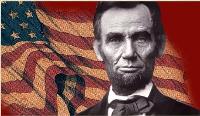
Offers a day-by-day log of events in Lincoln’s life and includes full-text links to documents in Roy P. Basler's Collected Works (1953).
Consists of a wide-ranging compilation of primary and secondary sources on Lincoln varying in format from text to sound to video. The site offers hundreds of rare Lincoln publications as well as full-text transcripts of Douglas Wilson and Rodney Davis’s Herndon’s Informants (1997). Spearheaded by historian and digital humanist Drew Vandecreek, Lincoln/Net organizes Lincoln information from the standpoint of historical themes, Lincoln’s biography, teacher tools, and cultural tourism.

Offers searchable access only to selected newspapers from the 1880s to 1920, but the Chronicling America section of the site provides summary records of all American newspapers published since the seventeenth century. This site will eventually hold full-text access to newspapers from the entire period of American history.

